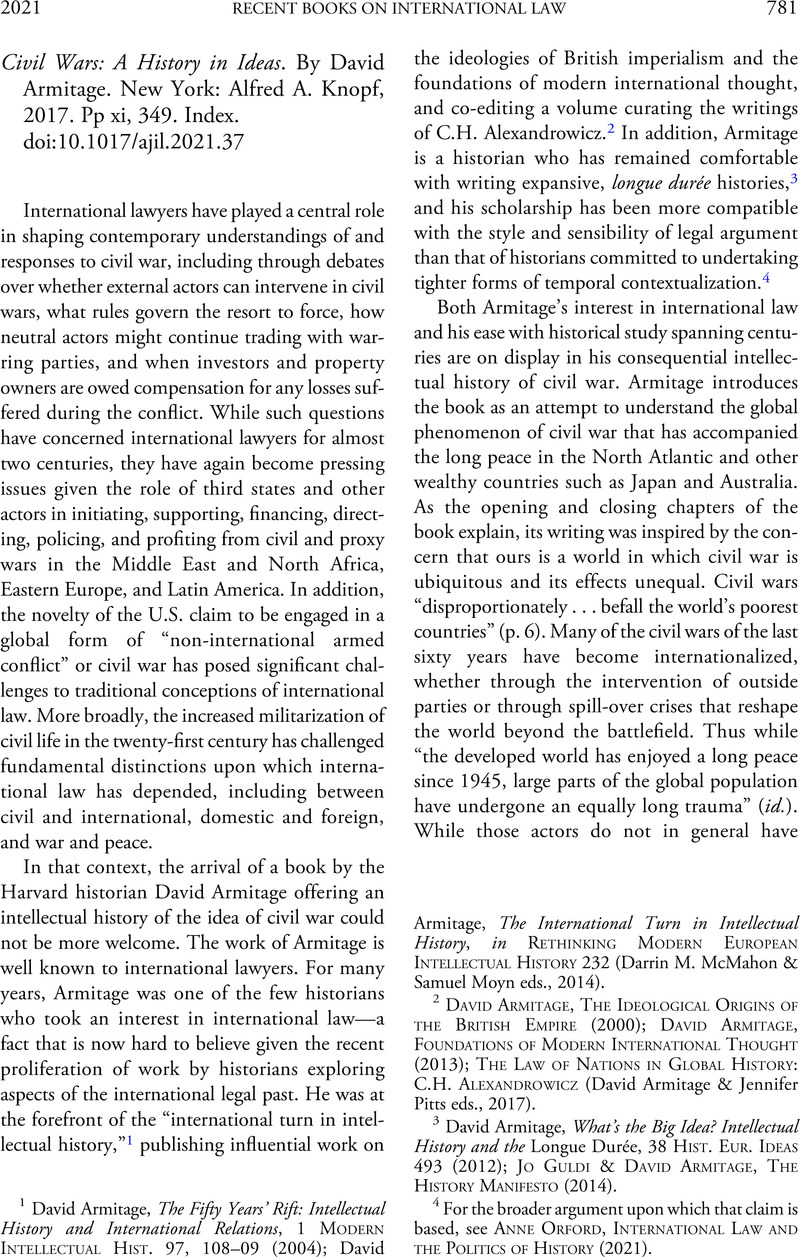No CrossRef data available.
Article contents
Civil Wars: A History in Ideas. By David Armitage. New York: Alfred A. Knopf, 2017. Pp xi, 349. Index.
Published online by Cambridge University Press: 15 October 2021
Abstract

- Type
- Book Reviews
- Information
- Copyright
- Copyright © The Author(s), 2021. Published by Cambridge University Press for The American Society of International Law
References
1 Armitage, David, The Fifty Years’ Rift: Intellectual History and International Relations, 1 Modern Intellectual Hist. 97, 108–09 (2004)Google Scholar; Armitage, David, The International Turn in Intellectual History, in Rethinking Modern European Intellectual History 232 (Darrin M. McMahon & Samuel Moyn eds., 2014)Google Scholar.
2 David Armitage, The Ideological Origins of the British Empire (2000); David Armitage, Foundations of Modern International Thought (2013); The Law of Nations in Global History: C.H. Alexandrowicz (David Armitage & Jennifer Pitts eds., 2017).
3 David Armitage, What's the Big Idea? Intellectual History and the Longue Durée, 38 Hist. Eur. Ideas 493 (2012); Jo Guldi & David Armitage, The History Manifesto (2014).
4 For the broader argument upon which that claim is based, see Anne Orford, International Law and the Politics of History (2021).
5 That is the focus of a five-year project funded by the Australian Research Council on Civil War, Intervention, and International Law that I directed at Melbourne Law School from 2015 to 2021. For an introduction to my argument, see Anne Orford, Civil War and the Transformation of International Law, Recueil des Cours (forthcoming).
6 On making rather than finding patterns in history, see further Orford, supra note 4, at 253–84.
7 David Armitage, British Political Thought in History, Literature and Theory, 1500–1800 (2006); David Armitage, The Declaration of Independence: A Global History (2007); Shakespeare and Early Modern Political Thought (David Armitage, Conal Condren & Andrew Fitzmaurice eds., 2009); The Age of Revolutions in Global Context, c. 1760–1840 (David Armitage & Sanjay Subrahmanyam eds., 2010).
8 See, e.g., Anthony Cullen, The Concept of Non-international Armed Conflict in International Humanitarian Law (2010); Sandesh Sivakumaran, The Law of Non-international Armed Conflict (2012); Amanda Alexander, International Humanitarian Law, Postcolonialism and the 1977 Geneva Protocol I, 17 Melb. J. Int'l L. 15 (2016); Giovanni Mantilla, Forum Isolation: Social Opprobrium, and the Origins of the International Law of Internal Conflict, 72 Int'l Org. 317 (2018); Boyd van Dijk, Human Rights in War: On the Entangled Foundations of the 1949 Geneva Conventions, 112 AJIL 553 (2018).
9 Anghie, Antony, Civilization and Commerce: The Concept of Governance in Historical Perspective, 45 Vill. L. Rev. 887 (2000)Google Scholar; Mégret, Frédéric, From “Savages” to “Unlawful Combatants”: A Postcolonial Look at International Humanitarian Law's “Other,” International Law and Its Others 265 (Anne Orford ed., 2006)Google Scholar; Mégret, Frédéric, Theorizing the Laws of War, in The Oxford Handbook of the Theory of International Law (Anne Orford & Florian Hoffmann eds., 2016)Google Scholar; Ntina Tzouvala, Capitalism as Civilisation: A History of International Law (2020).
10 See, e.g., Orford, Anne, Locating the International: Military and Monetary Interventions After the Cold War, 38 Harv. Int'l L.J. 443 (1997)Google Scholar; Anne Orford, Reading Humanitarian Intervention: Human Rights and the Use of Force in International Law (2003); David Kennedy, Of War and Law (2006).




